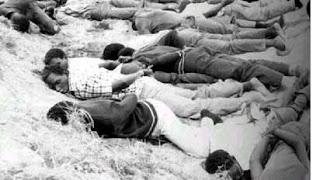The outreach report, which is volume two of the document Taking Transitional Justice to the People, was officially launched by the Minister of State Enterprises and Parastatals, Gorden Moyo, in Bulawayo last Friday.
Titled, Who Will Dare Begin The Process of Recovering the Truth, the document sets out the experiences of the Zimbabwe Human Rights NGO Forum and its associates, who conducted outreach meetings in 51 constituencies to take the concept of transitional justice to the community.
Titled, Who Will Dare Begin The Process of Recovering the Truth, the document sets out the experiences of the Zimbabwe Human Rights NGO Forum and its associates, who conducted outreach meetings in 51 constituencies to take the concept of transitional justice to the community.
It says the overriding plea of all participants was for “truth recovery and truth disclosure to redress the human rights abuses of the past and in so doing foster true national reconciliation’’.
According to the report, all the participants at the outreach meeting held in Nkayi agreed that those involved in the Gukurahundi massacres that took place in Matabeleland and parts of Midlands should apologise for the atrocities.
“President Robert Mugabe should come to the people and apologise for the massacres that happened in Matabeleland,’’ an elderly male participant said at the Nkayi meeting.
Participants also stressed that there could be no reconciliation if the truth on what happened during the Gukurahundi massacres is not acknowledged.
“There is no other way to reconcile the region of Matabeleland with the rest of the country if the truth of what happened during Gukurahundi is not known. Even for an apology to be accepted, it must be clear what is being apologised for,’’ reads the report.
The document also details how there was silence in the 1980s over the atrocities but explains that on March 16 1983, Catholic Commission for Justice and Peace (CCJP) representatives — Mike Auret, Bishop Henry Karlen and Bishop Patrick Mutume met with President Mugabe who was then Prime Minister and presented a comprehensive dossier of evidence of the atrocities which were committed by the Fifth Brigade in Matabeleland and the Midlands.
The evidence was collected by priests and missionaries who worked in rural Matabeleland and the Midlands.
A month later however, President Mugabe refuted the allegations and accused his critics of being “a band of Jeremiahs (which) including reactionary foreign journalists, non-governmental organisations of dubious status in our midst and sanctimonious prelates.’’
He accused the CCJP of condemning the Fifth Brigade and not the dissidents.
In January 1984, the government set up the Simplicius Chihambakwe Commission of Inquiry to investigate the atrocities but its findings were never made public.
When the Legal Resources Foundation set up shop in Lupane in 1984, it was inundated with enquiries from people wanting to obtain death certificates for heads of families who had “disappeared’’ in the 1980s and to enable children to get birth certificates so they could go to school and for other administrative purposes.
This prompted the foundation and CCJP to document the atrocities resulting in a report: Breaking the Silence, Building True Peace in 1987 which became the only published report on Gukurahundi.
The Human Rights NGO Forum report compiled this year says participants at the meeting in Bulilima were also concerned about the aftermath of Gukurahundi.
“The victims of Gukurahundi need to be rehabilitated. Some may need counselling because they have not been able to deal with the trauma. Where possible, the perpetrators must be made to pay for the damages and the pain they caused,’’ was one of the recommendations made by participants in Bulilima.
The report says the “arrogance of the leadership in failing to acknowledge past wrongs came out as a major obstacle to reconciliation’’.
About 20 000 people are believed to have been killed during the Gukurahundi atrocities.
